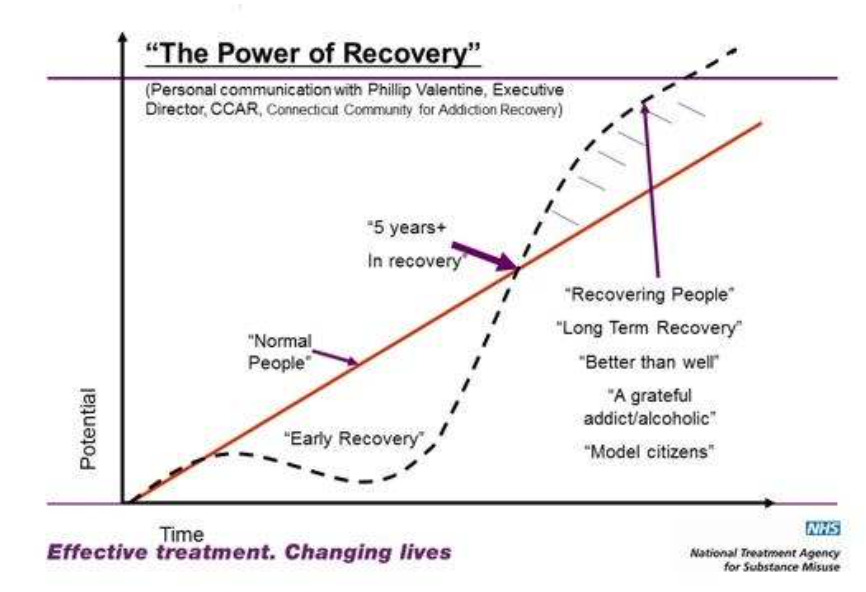The idea that people who are in abstinent recovery are ‘better than well’ has been around for over a decade. This seems to have been popularised by a graphic produced by the National Treatment Agency in England in 2010 (see below) that contained a graph that ‘showed’ this. This curious artifact is not the result of research or any statistical analysis. It is labelled as being the product of a “discussion with Phillip Valentine, Executive Director CCAR”. CCAR is a private healthcare provider in the US state of Connecticut.

Subsequently, UK research seemed to explore two related issues - either that people who are in abstinent recovery from problem substance use are ‘better’ than they would have been if they had never had a substance problem or that people in this situation are ‘better’ than the general population.
For example, a study in Birmingham (Hibbert and Best, 2011) of 53 older people in abstinent recovery from problem alcohol use ‘reported higher scores in the social and environmental elements of their Quality of Life measurement’ and proposed these scores ‘may exceed those in the general population’. To quote one paper (Collins, A and McCamley, A (2018). “These studies contributed to recovery being conceived as less a return to ‘normal’, but more as a process towards higher levels of appreciation and fulfilment of quality of life”.
There is some confusion here. Is it postulated that people in recovery are necessarily ‘better’ than they would have been without having had a substance use problem? This suggests that developing a serious substance use problem that may last years and result in significant health and other issues, should be regarded as a positive lifestyle choice as it has positive impacts on long term health. This may run counter to the personal experience of vast majority of people who have had a long-term substance use problem. Also, in terms of research methodology how would one prove such a thing? Who could know what trajectory a life may have taken if years and sometimes decades had been lived in very different circumstances than they actually were?
The research quoted is based on self-reported personal perceptions of health and wider well- being of 53 middle aged men in recovery from an alcohol problem. The researchers then seem to have compared these scores with those of the national average for a comparator population. An argument that someone in abstinent recovery from problem alcohol use is actually better off in terms of health and well-being etc than the general population would be very hard to sustain. The health of many people who have had substance use problem is often hugely compromised by the impact of substance use.
Some of these papers, and the NTA graphic referred to above, use language like ‘a grateful addict’. This takes us closer to the thrust of what ‘better than well’ actually means – that people who have been through difficult situations including problem substance use are sometimes grateful for things that other people can sometimes take for granted – this is a long way from being ‘better than well’ and from the way this term is often used.
It may seem odd that the NHS in England would promote the notion that the purpose of treatment should be to create ‘grateful addicts’ or ‘model citizens’. This is a good example of the complex relationship between political ideology, government strategy, research and service delivery. (see recovery)
Hibbert, L. and Best, D. (2011) Assessing Recovery and Functioning in Former Problem Drinkers at Different Stages of Their Recovery Journeys Drug and Alcohol Review
Collins, A. and McCamley, A. 2018. Quality of life and better than well Drugs and Alcohol Today May 2018
